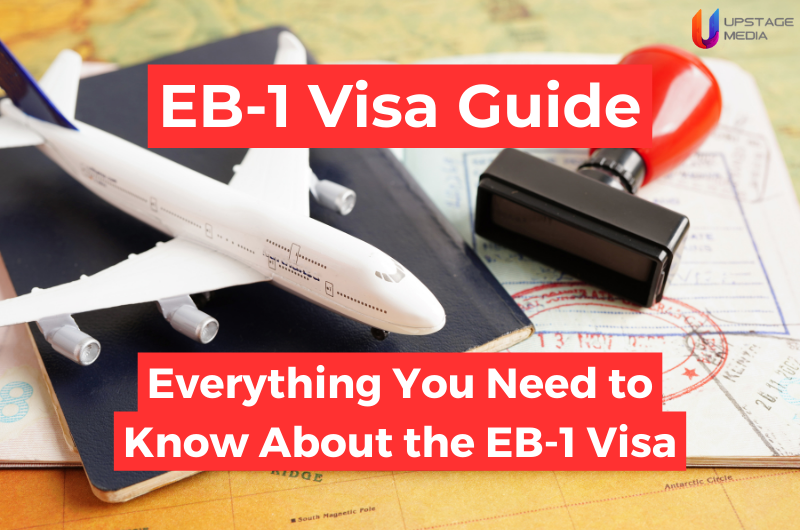Table of Contents
Recently updated on April 23rd, 2024
The EB-1 Visa offers permanent residency to individuals with extraordinary talent (EB-1A), distinguished professors and researchers (EB-1B), as well as multinational executives and managers (EB-1C). Although the EB-1A category permits self-petitioning, the EB-1B and EB-1C classifications need a sponsoring employer based in the United States.
Significantly, the EB-1 Visa lacks a backlog due to oversubscription. Moreover, fulfilling the stringent eligibility criteria demands robust documentation demonstrating remarkable accomplishments that set the applicant apart from their peers. However, in this article, we will be discussing EB-1 Visa.
What is an EB-1 Visa?
Individuals eligible for an EB-1 Visa have an advantage because it is the highest preference category for employment-based green cards. The EB-1 Visa recognizes individuals with extraordinary ability in sciences, arts, education, business, or athletics (EB-1A), outstanding professors and researchers with international recognition or holding senior positions within a prominent institution (EB-1B), and multinational executives and managers who have been employed abroad for at least one of the past three years in a managerial or executive capacity and who seek to enter the United States to continue working for the same employer or its affiliate (EB-1C).
Navigating the EB-1 Visa green card process starts with submitting an EB-1 Visa petition that demonstrates eligibility under one of the three EB-1 preferences. If approved, this allows eligible applicants to permanently live and work in the United States as lawful permanent residents or green card holders. This provides associated benefits like not needing an employment sponsorship, the ability to live permanently and work for any employer in the U.S., and a path to U.S. citizenship.

How Does an EB-1 Visa Work?
While only around 40,000 individuals each year qualify for an EB-1 Visa based on their extraordinary accomplishments in fields like the arts, sciences, business, or education, demonstrating elite excellence on an international or national stage through prestigious awards and high-profile recognition can help substantiate claims of distinction.
Gaining approval of an EB-1 Visa petition unlocks several significant benefits. The EB-1A classification permits self-petitioning, allowing someone to directly file for themselves without needing a corporate sponsor.
However, those seeking an EB-1B or EB-1C Visa must secure a supporting petition from an American employer to qualify for the coveted EB-1 Green Card, a process requiring companies to complete the formal EB-1 Visa Petition submitted to the United States Citizenship and Immigration Services.
While an impressive achievement on its own, obtaining this specialized visa opens doors to long-term residence and career opportunities within the United States for top talent from abroad who have attained the highest levels of skill, fame, or expertise in their respective fields.
Also Read: What’s the Difference Between an O-1 Visa and an EB-1 Green Card?
Who is Eligible for an EB-1 Visa?
EB-1A visa applicants are required to exhibit exceptional talent, skill, or accomplishments in fields like sciences, arts, or business by fulfilling a minimum of three benchmarks such as awards, publications, substantial contributions, and high commercial success.
While the standards are rigorous, those who meet at least three of eligibility for an EB-1 Visa is intended for professors and researchers with outstanding abilities, applicants must have at least three years of experience in their field.
Individuals seeking this visa to teach or conduct research in the United States must meet two qualifying criteria, such as having received significant awards or honors, authoring influential publications, or making noteworthy contributions to advancements in their specialized area of expertise. This visa pathway considers the professional accomplishments of candidates to determine if they have risen to the top of their field.
The EB1C Visa requires multinational managers or executives employed by a U.S.-based company to have worked for that company outside the United States for at least one year, with the employer having a qualifying relationship and business history of operating in the U.S. for at least one year as well.
This immigration process involves the EB-1 Visa Green Card Process wherein a company files an EB-1 Visa Petition on behalf of the international manager or executive to obtain lawful permanent resident status or a green card, allowing them to live and work in the U.S. long-term without restrictions.
The EB-1 Visa category aims to facilitate the immigration of high-level professionals with distinguished talents and abilities in order to benefit the U.S. economy, but certain eligibility criteria regarding it are important to know.

What are the Benefits of an EB-1 Visa?
EB-1 Visa category allows those with demonstrated excellence in their fields to avoid lengthy processing times that other employment-based visa categories require. So here we have discussed some benefits of an EB-1 Visa.
- EB-1 Visa applicants benefit from being exempt from labor certification, which simplifies and streamlines the process. This exemption expedites the EB1 Visa application significantly, as no certification from the Department of Labor is necessary. By not requiring labor certification, the EB1 Visa process can move forward more quickly without that typical step.
- EB-1 Visa offers some of the fastest processing times of any employment-based immigration category, with “current” priority dates for all countries of chargeability. This signifies there is no significant backlog in the application queue, allowing candidates to move through the process relatively swiftly without long wait times. The lack of a substantial backlog helps streamlines the application procedure for potential applicants by minimizing delays before an application.
- The EB-1 Visa provides you, your spouse, and minor children with the opportunity to obtain Green Cards, allowing you all to reside, work, travel, and learn within the United States as permanent legal residents. This visa category permits individuals of extraordinary ability in the sciences, arts, education, business, or athletics to gain lawful permanent resident status without being constrained by annual employment-based country quotas or needing a permanent job offer.
What are the Risks of an EB-1 Visa?
Exploring an EB-1 Visa pathway involves understanding distinct hurdles and hazards that may arise. Demonstrating eligibility for an EB-1 Visa requires considerable evidence of exceptional talents, which fulfills a tough standard. Attaining the subsequent advantages of an EB-1 Visa depends on skillfully guiding the intricate EB-1 Visa Green Card Process by starting the EB-1 Visa Petition.
Proving extraordinary ability involves documenting a sustained national or international acclaim and recognition for achievements in the sciences, arts, education, business, or athletics. Successfully navigating the EB-1 Visa Green Card Process allows one to obtain permanent resident status.
EB-1A Visa applicants, who demonstrate extraordinary ability in the sciences, arts, education, business, or athletics, have the unique ability to self-petition for permanent residency without requiring an employer sponsor.
Meanwhile, those seeking an EB-1B Visa for outstanding professors and researchers or an EB-1C Visa for multinational executives and managers must obtain sponsorship from a qualified employer in the United States, complete with a validated permanent job offer.
How Much Does an EB-1 Visa Cost?

For those eligible for an EB-1 Visa, filing paperwork for permanent residency through this visa category involves submitting various forms and paying the associated fees. Specifically, applicants must file Form I-140, which has a fee of $700. Additional costs include $1,140 to submit Form I-485 to apply for adjustment of status, $325 for Form DS-260 to schedule a visa interview appointment, $85 for biometrics collection, and $220 in USCIS filing fees.
To start the EB-1 Green Card Process, individuals must first initiate the EB-1 Visa Petition by gathering evidence to prove extraordinary ability, outstanding professors/researchers qualifications, or multinational manager qualifications depending on which EB-1 classification they seek. Navigating all the steps and requirements takes diligence to complete.
Conclusion:
Those who qualify for an EB-1 Visa have the opportunity to take advantage of the many advantages that it offers. By starting this, those eligible can embark on the EB-1 Visa Green Card Process to gain permanent resident status in the United States.
The EB-1 Visa allows one to experience the numerous benefits, such as the ability to live and work long-term in the U.S. without sponsorship or employment restrictions. While navigating the process takes effort, initiating the petition is the first crucial step toward lawfully residing in the country on a permanent basis.
FAQs:
1. Is there a cap on the number of EB-1 Visas issued each year?
No, there is no set number limit for EB-1 Visas, meaning it is a preference category without a yearly limit on visas issued.
2. Can I appeal a denied EB-1 Visa application?
You can ask for another review of your denied case. Talk to an immigration lawyer about how to request another look at your case.
3. What is the processing time for an EB-1 Visa?
Premium processing provides a faster review for certain types of applications. It costs extra but can speed things up.
4. Do I need an immigration attorney for my EB-1 Visa application?
Hiring an immigration lawyer is not required but they can help navigate complicated rules and increase the chances of approval for your application.
5. Can I switch jobs while my EB-1 Visa is in process?
Switching careers during the procedure could affect your application. Talk to a lawyer to comprehend the results and actions to take.
